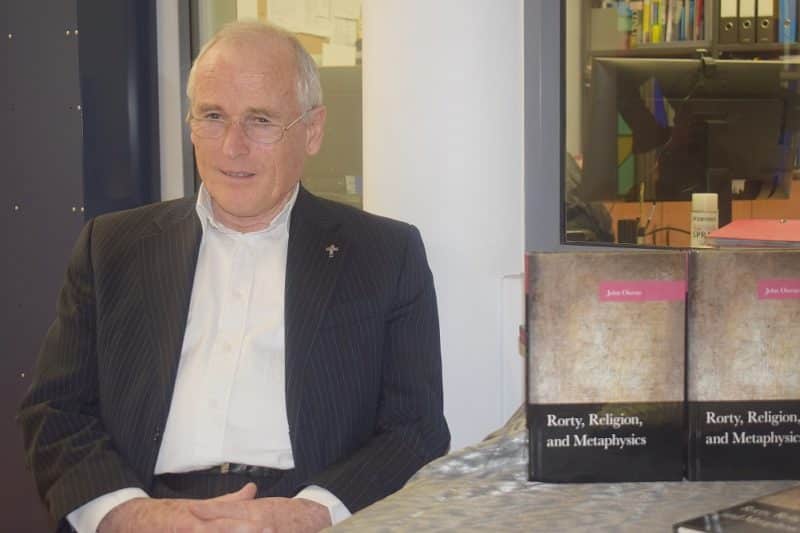How does one engage in a philosophical argument with one of the leading lights of American pragmatism?
In 2006, lecturer in philosophy at Te Kupenga – Catholic Theological College Fr John Owens, SM, set about reading everything he could about American philosopher Richard Rorty. The Kiwi academic ended up publishing a book in 2019.
The book, “Rorty, Religion and Metaphysics” was launched on August 5, at the Catholic Theological College on Ponsonby Road, Auckland.
Fr Merv Duffy, SM, in introducing Fr Owens, said the book is not a “potboiler”, but is “a serious book about deep issues”.
“It’s taken years of research and then years of polishing, until it is a gem of clarity and precision,” Fr Duffy said.
“Those of you accustomed to John Owens’ style of communication may not be surprised to discover that the book we are launching entitled ‘Rorty, Religion and Metaphysics’ is a book about Richard Rorty, religion and metaphysics,” he said.
“The interesting thing about Rorty’s pragmatism, is that it’s a way of seeing the world that abandons both religion and metaphysics, at least as they have been traditionally understood. So, and this is the storyline, John Owens disagrees with Richard Rorty.”
Fr Owens, in explaining in more detail what his book is about, started by saying “metaphysics, and most of religion, start from the belief that there is a way things finally are, and a final truth about this”.
“If reality is a certain way, we should find out about it and say what it is,” he said.
Rorty’s philosophy, however, rejected metaphysics and religion.
“He (Rorty) came to think that, for all that it dominated Western philosophy, the metaphysical vision never delivered. The arguments for it are always circular. Philosophical harmony never happened. So, we should just get out of the mindset of metaphysics, where we are pointed toward something large and non-human, to which we owe allegiance. We should simply give it up, as one commentator says, in the way we might give up smoking,” explained Fr Owens.
For Rorty, a self-described pragmatist, words are tools, and languages are instruments, that human beings developed to cope with their environment. Some words or vocabularies are not better than others because they more accurately represent the world, but they are better because they work better for our purposes.
“He [Rorty] thinks we should give up questions about corresponding to a final state of affairs, and simply treat our languages as instruments that we develop in order to create and achieve interesting forms of life,” Fr Owens said.
“This runs fundamentally against the Christian view that God made the world through the Word, so that there is an original way that the things of the world are, and our knowledge should first of all try to correspond to the way they are.”
Fr Owens cited the moral example that Rorty used: A child growing up in a feral state, who is discovered by a community, which then takes the child in and does their best for her. Rorty would say that the child has no dignity of her own, and that the community is not responding to a deep metaphysical reality (her dignity), but simply applying their own vocabulary and traditions in helping her.
Fr Owens said the main argument of his book is that “this will not do”.
“It is not enough to see the world just as the correlates of vocabularies we happen to have developed. Particularly when we deal with another person, they do not appear just in light of a vocabulary of ours, but they somehow demand the use of a particular vocabulary.
“I think that this encounter with other people first brings us to a sense of reality, the strange conviction that the objects of our mind are not just objects of our mind, but are realities in their own right, that demand a kind of recognition. In Aristotle’s terms they have reality, or ousia,” he said.
Fr Duffy said Fr Owens explained Rorty’s theories so well that reviewers of the book recommend it as a good way to understand the American philosopher.
“Evidence of its success is that this book is being accepted for the American Philosophy series,” Fr Duffy said.

Reader Interactions